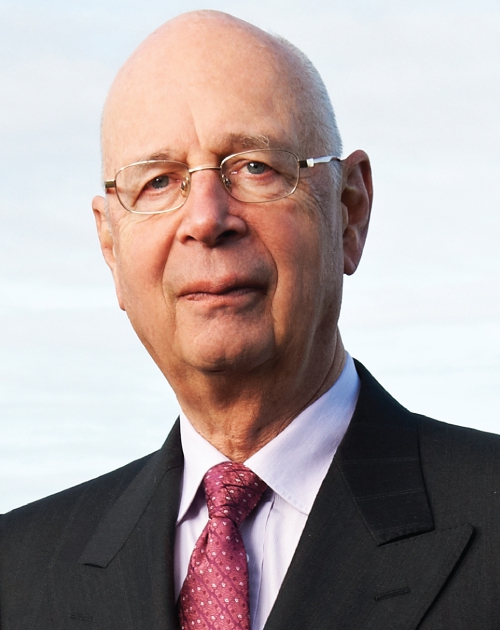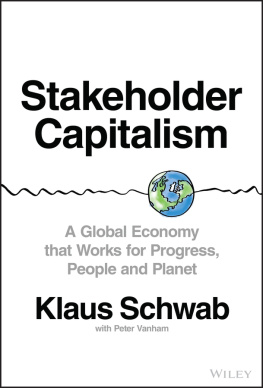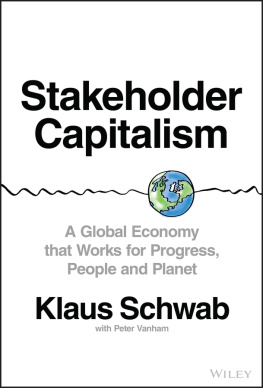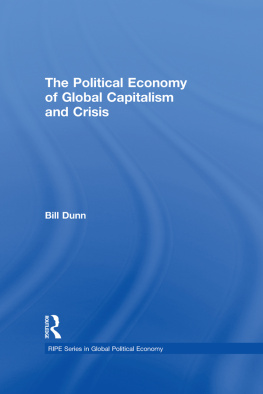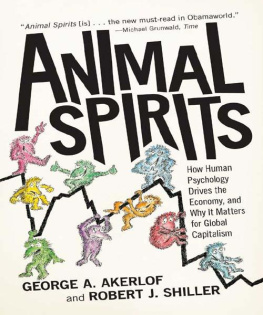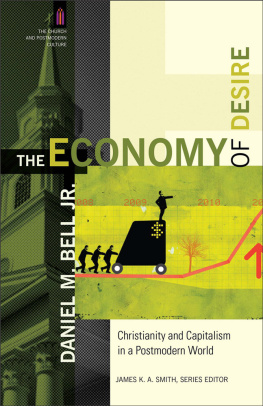Table of Contents
List of Illustrations
Chapter 2
Chapter 3
Chapter 4
Chapter 5
Chapter 6
Chapter 7
Chapter 8
Chapter 10
Fifty years ago Klaus Schwab first proposed his theory that businesses are not only responsible to their shareholders, but also to all their stakeholders. With a global economic system generating deep divisions and inequalities, Klaus renews his call for a form of capitalism that works for everyone and where businesses don't just take from society but truly give back and have a positive impact. Stakeholder Capitalism is an urgent call to action.
Marc Benioff, Chair and CEO, Salesforce
If you think this is just another pre-COVID/post-COVID book, think again. Klaus Schwab draws on his vast experience to take us on a roller-coaster ride past the highs and lows of post-war capitalism. His knack for economic storytelling gives you a real and deep insight into where we are headed and what we should be aiming for.
Alexander De Croo, Prime Minister of Belgium
We can no longer think short term. Companies need to answer to more than their shareholders; they need to be accountable to higher morals. Now, in the middle of the COVID-19 crisis, Klaus Schwab shows us that we cannot go back to business as usual. He inspires us to look at the current response of global solidarity between people, companies, and governments to this health crisis and see it as the unequivocal way to a new paradigm to tackle the climate crisis and the scandal of rising inequality in the world.
Anglique Kidjo, Musician and UNICEF Goodwill Ambassador
For a half-century, Klaus Schwab has been consistent in his belief that public companies can drive great returns for their shareholders AND address society's most important priorities. The world now understands that the system he envisionedwhat we call Stakeholder Capitalismcan align capital to those outcomes better than any other.
Brian Moynihan, CEO, Bank of America
Stakeholder Capitalism offers a timely analysis that shows how the neoliberal economic system privileges billionaires and extractive corporations over the dignity of billions of people and the protection of our planet. As COVID-19 has deepened despair and economic, gender and racial inequalities, governments mustwith stakeholdersact decisively to depart from shareholder-first capitalism and instead put human rights at the heart of our economy.
Gabriela Bucher, Executive Director, Oxfam International
Professor Schwab's new book offers us insightful perspectives on the world's economic history and the thinking that has led us towards the greatest challenges we face today none larger than climate change. More importantly, it offers a blueprint for the future, inviting us to build a more inclusive, prosperous, healthier and greener world by embracing Stakeholder Capitalism at scale.
N. Chandrasekaran, Executive Chairman, Tata Sons
In Stakeholder Capitalism my good friend Professor Schwab outlines an inspiring way forward in making the global economy more equitable, sustainable and future-proof. A vision that fits in perfectly with all his efforts over the years to build a better world. Once again, Professor Schwab gives us food for thought and reflection with this fascinating book.
Mark Rutte, Prime Minister of the Netherlands
STAKEHOLDER CAPITALISM
A GLOBAL ECONOMY THAT WORKS FOR PROGRESS, PEOPLE AND PLANET
KLAUS SCHWAB
with Peter Vanham
Copyright 2021 by World Economic Forum. All rights reserved.
Published by John Wiley & Sons, Inc., Hoboken, New Jersey.
Published simultaneously in Canada.
No part of this publication may be reproduced, stored in a retrieval system, or transmitted in any form or by any means, electronic, mechanical, photocopying, recording, scanning, or otherwise, except as permitted under Section 107 or 108 of the 1976 United States Copyright Act, without either the prior written permission of the Publisher, or authorization through payment of the appropriate per-copy fee to the Copyright Clearance Center, Inc., 222 Rosewood Drive, Danvers, MA 01923, (978) 750-8400, fax (978) 646-8600, or on the Web at www.copyright.com. Requests to the Publisher for permission should be addressed to the Permissions Department, John Wiley & Sons, Inc., 111 River Street, Hoboken, NJ 07030, (201) 748-6011, fax (201) 748-6008, or online at http://www.wiley.com/go/permissions.
Limit of Liability/Disclaimer of Warranty: While the publisher and author have used their best efforts in preparing this book, they make no representations or warranties with respect to the accuracy or completeness of the contents of this book and specifically disclaim any implied warranties of merchantability or fitness for a particular purpose. No warranty may be created or extended by sales representatives or written sales materials. The advice and strategies contained herein may not be suitable for your situation. You should consult with a professional where appropriate. Neither the publisher nor author shall be liable for any loss of profit or any other commercial damages, including but not limited to special, incidental, consequential, or other damages.
If the book title or subtitle includes trademarks/registered trademarks (Microsoft, for example) that require a statement on the copyright page, please add here.
For general information on our other products and services or for technical support, please contact our Customer Care Department within the United States at (800) 762-2974, outside the United States at (317) 572-3993 or fax (317) 572-4002.
Wiley publishes in a variety of print and electronic formats and by print-on-demand. Some material included with standard print versions of this book may not be included in e-books or in print-on-demand. If this book refers to media such as a CD or DVD that is not included in the version you purchased, you may download this material at http://booksupport.wiley.com. For more information about Wiley products, visit www.wiley.com.
Library of Congress Cataloging-in-Publication Data is Available:
ISBN 9781119756132 (Hardcover)
ISBN 9781119756156 (ePDF)
ISBN 9781119756149 (ePub)
COVER ART & DESIGN: PAUL MCCARTHY
To my parents, Eugen Wilhelm Schwab ( ) and Erika Epprecht (), who taught me firsthand the value of education, collaboration, and the stakeholder principle
About the Authors
Professor Klaus Schwab is the founder and executive chairman of the World Economic Forum. In 1971, he first published Modern Enterprise Management in Mechanical Engineering . In the book, he argues that a company must serve not only shareholders but all stakeholders to achieve long-term growth and prosperity. To promote the stakeholder concept, he founded the World Economic Forum the same year.
Since his first publication, Schwab has authored and co-authored various books and reports, including the yearly World Economic Forum Global Competitiveness Report (1979present), The Fourth Industrial Revolution (2016), a worldwide best seller translated into 30 languages, Shaping the Future of the Fourth Industrial Revolution (2018, with Nicholas Davis), and COVID-19: The Great Reset (2020, with Thierry Malleret). Alongside his leadership of the World Economic Forum, Schwab also started the Schwab Foundation for Social Entrepreneurship with his wife, Hilde (1998), The Forum of Young Global Leaders (2006), and the Global Shapers Community (2011).

